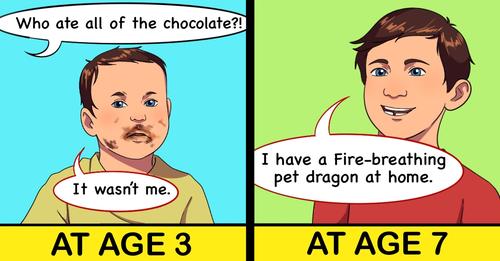
While most parents prefer to believe their children are innocent little angels incapable of any wrongdoing, the reality is that everyone, especially young kids, tell lies. Children can start lying as early as around the age of three (1). The motivations behind a child’s choice to lie, whether intentional or subconscious, are diverse. However, the fact remains that lying is a widespread practice. It is well-established that lying is unethical, and it’s crucial to teach our children to refrain from it. To assist in this endeavor, understanding why children are compelled to lie in the first place can be beneficial. In this article, we will delve into several scenarios in which children lie, the reasons behind these lies, and strategies to prevent them from recurring. Keep reading to learn more!
1. Children Lie To Test Out New Behavior And See What Happens
Sometimes, children may lie simply out of curiosity, to gauge the reactions to their new behaviors and mannerisms. This is particularly true if lying is a recent development in your child’s behavior. It’s likely they’ve only recently discovered this concept and are experimenting to see what unfolds. Their aim is to observe how you respond, what actions you take, and whether you view this behavior as acceptable or not. When kids are young, they might resort to lying as a means of self-protection in situations where they fear the adult’s potential anger or sadness. They aim to avoid facing stern questioning. However, as they grow older, lying can also result from their vibrant imagination running away with them. Children often don’t fully comprehend the concept of lying or how to do it deliberately until they reach elementary school age.
2. Children Tell White Lies
Occasionally, children may tell lies for the sake of someone else or due to inadvertent encouragement to do so. Perhaps you’ve been at a party and asked your child to drink orange juice and express enjoyment, even when they dislike it. Or maybe you’ve prompted them to act thrilled when receiving a sweater from their grandparents, even though they know they won’t wear it. This is when children begin to grasp the concept of the “white lie,” which is a falsehood told to spare someone’s feelings.
We frequently observe people employing white lies in everyday interactions. For instance, we might offer a less-than-sincere compliment to someone we care about or fib out of politeness when the truth would be too harsh. The same principle applies to children. While this practice may not generally be detrimental, it’s also crucial to teach your children to remain true to their own beliefs and preferences without compromising in order to accommodate others.
3. Children Lie Out Of Impulse
At times, a child’s lie may be devoid of deliberate intent. It might occur because a child speaks before thinking, turning lying into an impulsive reaction. This can be particularly prominent in situations where children have ADHD, as they may lack the necessary neurotransmitters for complete impulse control (2). Therefore, the actual underlying reason for children lying, even when it’s unintentional, is their struggle with impulse control.
4. They Want To Make Themselves Look Cooler
Something all that really lies underneath your child’s extensive lies is the need to impress their peers. Maybe they lied to their friends and told them that they have a baby brother on the way just to be able to relate to them better or maybe they lied about what their favorite cartoon is, whatever the cases may be, they are just doing it in order to be liked. They might also achieve this by stretching the truth or inventing a story with the aim of earning approval or presenting themselves in a favorable manner.
One motivation for trying to impress their peers is the desire to be seen as “cool,” which, in turn, facilitates their acceptance within the group. This can be especially relevant for children who grapple with self-esteem challenges and feel unsure about fitting in with their social circles. But you must keep in mind that children often put a lot of pressure on themselves in order to be accepted by peers they look up to so some amount of lying is expected. Teach your children to be self confident so that they don’t seek external validation. This way they will remain authentic and will not be tempted to lie for this reason.



